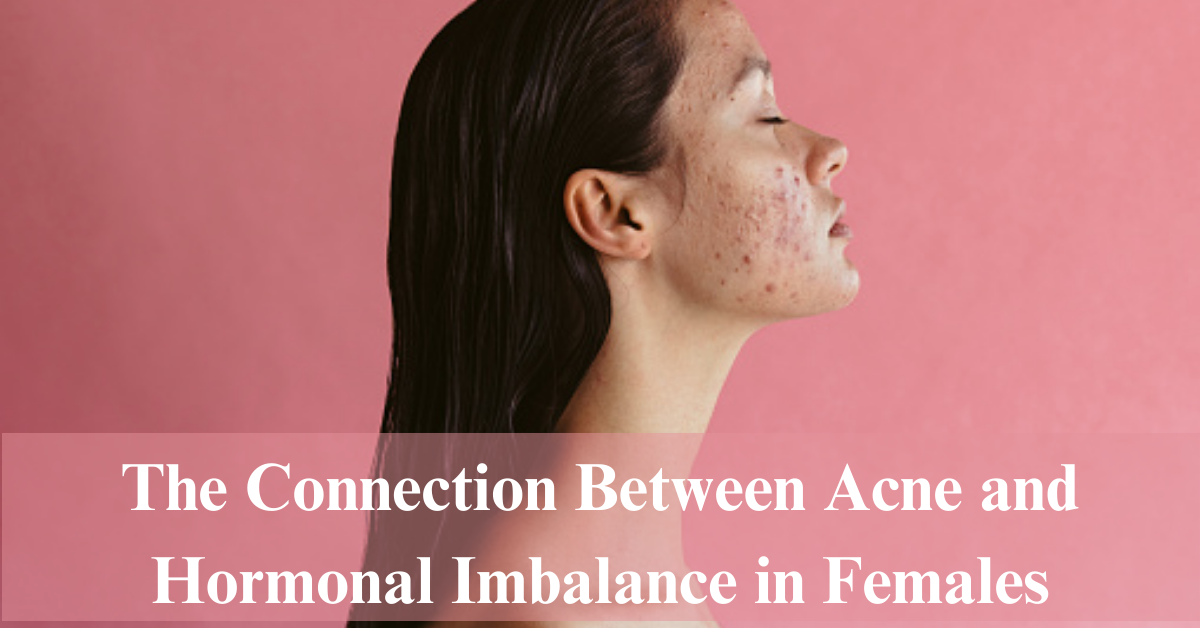Acne is a common and often distressing condition that affects many individuals, particularly during adolescence. For females, the relationship between acne and hormonal imbalance is especially intricate and significant. Understanding how these two factors are connected can provide insights into effective management and treatment strategies.
The Hormonal Landscape
Hormones are chemical messengers that regulate various bodily functions, including metabolism, growth, mood, and reproduction.
In females, key hormones such as estrogen, progesterone, and androgens (male hormones like testosterone) play a vital role in reproductive health and skin condition. When these hormones fluctuate, they can have a pronounced impact on the skin, often leading to acne.
How Hormonal Imbalance Leads to Acne
Increased Sebum Production:
Androgens, particularly testosterone, stimulate the sebaceous glands to produce more sebum (oil). Excessive sebum can clog pores, leading to the formation of acne. This is why many women experience acne flare-ups during puberty, pregnancy, or around their menstrual cycle when androgen levels can be higher.
Menstrual Cycle Fluctuations:
Many women notice their acne worsens in the days leading up to their period. This is due to the drop in estrogen and progesterone levels, which can cause an increase in sebum production and inflammation, leading to acne breakouts.
Polycystic Ovary Syndrome (PCOS):
PCOS is a common endocrine disorder that affects about 1 in 10 women of reproductive age. It is characterized by elevated levels of androgens, which can lead to persistent acne, irregular menstrual cycles, and other symptoms like weight gain and hirsutism (excess hair growth).
Pregnancy and Menopause:
Hormonal changes during pregnancy can lead to increased sebum production and acne. Similarly, menopause brings about a decline in estrogen levels, which can cause an imbalance with androgens and result in acne.
Stress:
Chronic stress can lead to elevated levels of cortisol, a hormone that can influence other hormonal balances in the body. High cortisol levels can increase androgen production, exacerbating acne.
Identifying Hormonal Acne
Hormonal acne typically presents itself in specific ways:
Location: It often appears on the lower face, jawline, and neck.
Timing: Breakouts often coincide with menstrual cycles, pregnancy, or menopause.
Persistence: Unlike typical teenage acne, hormonal acne can persist into adulthood.
Managing Hormonal Acne
Managing hormonal acne involves addressing both the acne itself and the underlying hormonal imbalance.
Here are some strategies:
Medical Treatments:
Birth Control Pills: Oral contraceptives can regulate menstrual cycles and reduce androgen levels, thereby decreasing acne.
Anti-Androgen Medications:
Drugs like spironolactone can help reduce androgen production and are often prescribed for women with hormonal acne.
Topical Treatments: Retinoids, benzoyl peroxide, and salicylic acid can help manage acne by promoting cell turnover and reducing inflammation.
Diet:
Reducing intake of high-glycemic foods and dairy may help manage acne. Incorporating anti-inflammatory foods like fruits, vegetables, protein and omega-3 fatty acids can also be beneficial.
Stress Management: Practices such as yoga, meditation, and regular exercise can help reduce stress and its impact on hormones.
Skincare Routine:
Using non-comedogenic products and maintaining a gentle skincare routine can prevent clogged pores and reduce acne flare-ups.
Regular Monitoring: Regular check-ups with a dermatologist or endocrinologist can help monitor hormone levels and adjust treatment plans as needed.
Conclusion
The connection between acne and hormonal imbalance in females is clear and multifaceted. Hormonal fluctuations can lead to increased sebum production and acne, making it essential to address both the skin condition and the underlying hormonal issues.
By understanding this connection and implementing a comprehensive management plan that includes medical treatment, lifestyle changes, and regular monitoring, women can effectively manage hormonal acne and improve their overall skin health.
- 9 Natural Ways to Balance Your Hormones
- The Connection Between Acne and Hormonal Imbalance in Females
- Why You Get Sleepy When You Meditate, Plus 9 Tips to Perk Up
- Symptoms of Heart Attacks in Women
- The Link Between Vitamin D and Hormones

